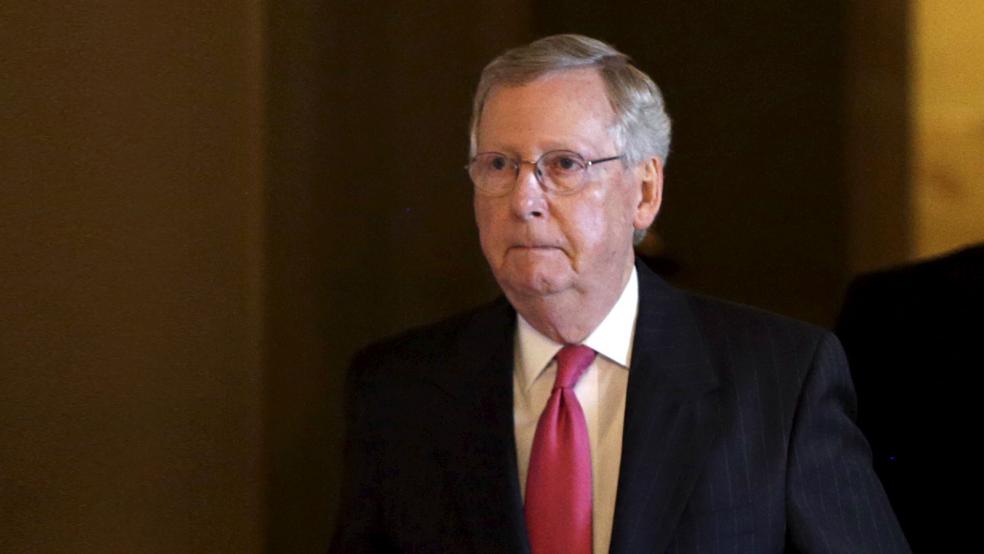Senate Republicans filled a huge gap in their proposal to replace the Affordable Care Act on Monday afternoon by imposing a six-month waiting period for people who apply for health insurance but are unable to demonstrate that they have had a full year of coverage leading up to the date of their application.
The amendment to the “discussion draft” that was issued last week addresses a key problem with the original version of the proposal, but does so in a way that is arguably much more harsh than a provision with the same aim that was part of a bill passed by the House of Representatives last month.
Related: 7 Huge Tax Breaks in the Senate GOP Health Care Plan
The problem that needed solving in the GOP bill was the free-rider issue. Under the Senate plan as originally released, insurers were not allowed to deny coverage to people who applied for it. This meant that healthy people could choose to go without insurance indefinitely, paying for coverage only if they fell ill and suddenly needed it.
This, as health care experts quickly pointed out, is a recipe for market failure. If only sick people buy insurance, either the insurers collapse or the cost of coverage quickly prices large numbers of people out of the market.
The Affordable Care Act sought to solve this problem through mandates. Americans were required to have health insurance, and would be charged a penalty if they didn’t.
Republicans objected to the mandate, but in the House, lawmakers recognized the free-rider issue as a problem and tried to solve it. They allowed insurers to charge consumers who sought coverage after being uninsured for more than two months 30 percent higher premiums for one year. Whether or not this was sufficient incentive is debatable, but the aim was to stabilize markets.
Related: Why Some GOP Senators Are Balking at Their New Health Care Plan
While the House version allowed the previously uninsured to get coverage immediately, albeit at raised prices, the Senate proposal would prevent them from purchasing any coverage at all for at least six months if they “cannot demonstrate 12 months of continuous creditable coverage ... without experiencing a significant break.”
There is little question that, as far as incentives go, the Senate version would persuade more Americans to buy coverage.
The financial downside of skipping coverage under the House plan is predictable and contained. It’s equal to 30 percent of the annual premium of whatever insurance policy you purchase. (Though you could argue that, in an emergency situation, an uninsured person might find themselves receiving expensive care before they are able to apply for a policy.)
Under the Senate plan, the financial downside is practically limitless. Six months of intensive medical treatment is more than enough to obliterate the savings and assets of the vast majority of Americans.
Related: The Obvious Problem With the ‘Simple’ GOP Solution for Health Care
There is also language in the Senate bill that appears to leave open the possibility of a wait that is actually considerably longer than six months if a previously uninsured person applies for coverage outside a designated enrollment period.
Insurers are instructed to make their coverage active on the “the later of the date that is 6 months after the day on which the individual submits an application for health insurance coverage; or the first day of the next plan year.”
While it’s not clear how enrollment periods would be set up under the GOP plan, if that requirement were applied under the ACA rules, it could result in people going nearly a full year without coverage.
For example, the open enrollment period for the ACA for people seeking 2018 plan-year coverage through its health care exchanges is set for November 1 through December 15. That’s for coverage beginning January 1, 2018.
Related: The Missing Detail That Could Kill the Senate Republican Health Care Plan
If a similar system were in place for plan year 2019, a previously uninsured person who doesn’t qualify for a special enrollment period could, for example, apply in February and have to wait until the following January for coverage to kick in.
Health care experts were still analyzing the proposal on Monday afternoon. Karen Pollitz, a senior fellow for health reform and private insurance at the Kaiser Family Foundation, said in an email that the language in the bill made it “unclear what they have in mind” with regard to the waiting period’s effective length.





